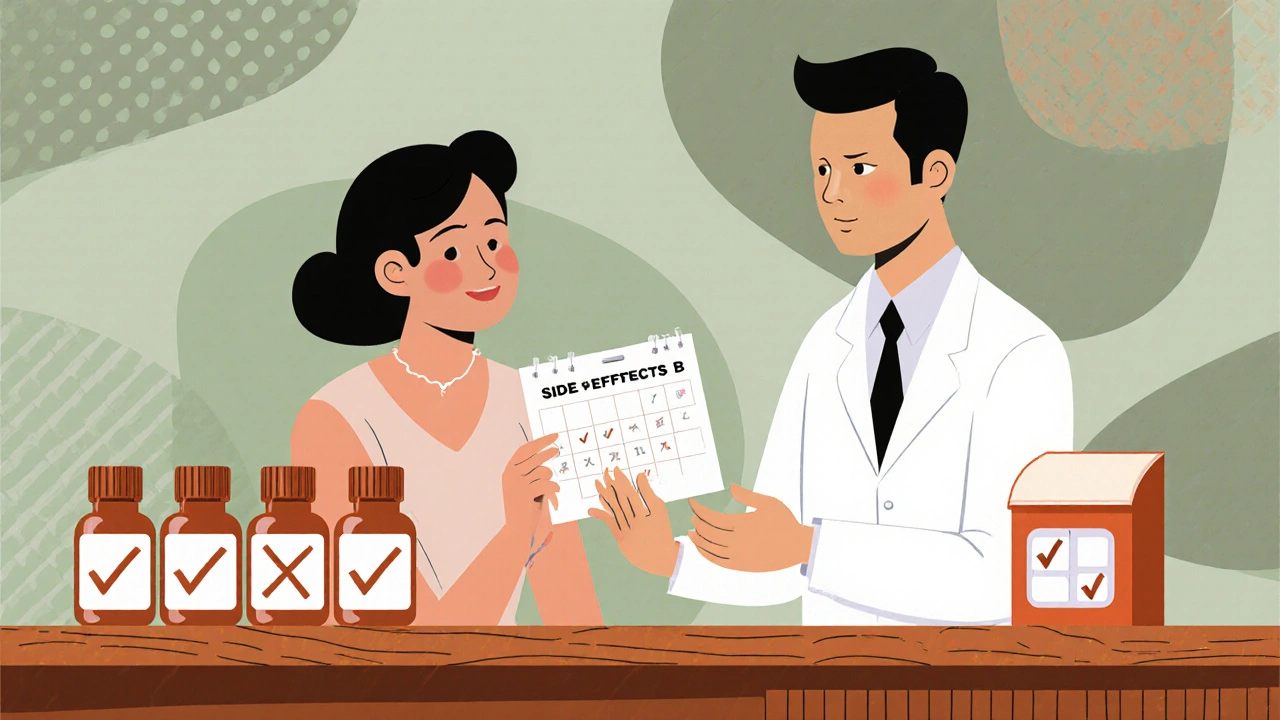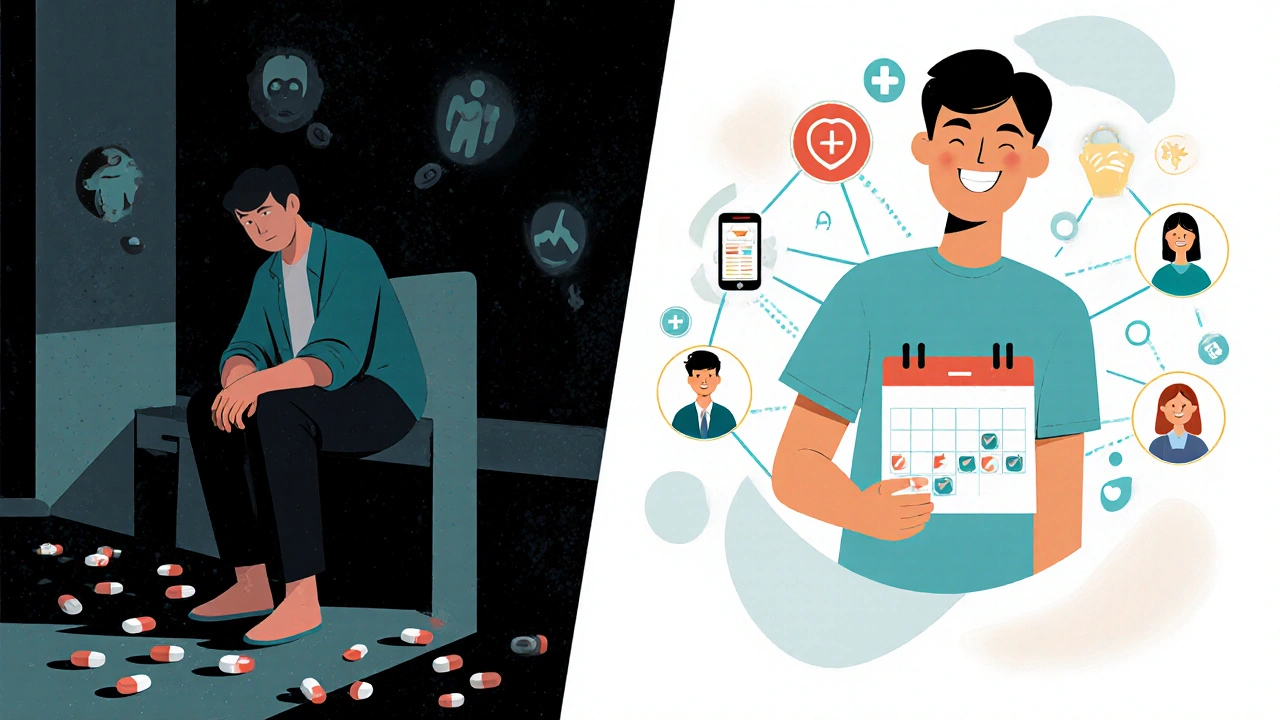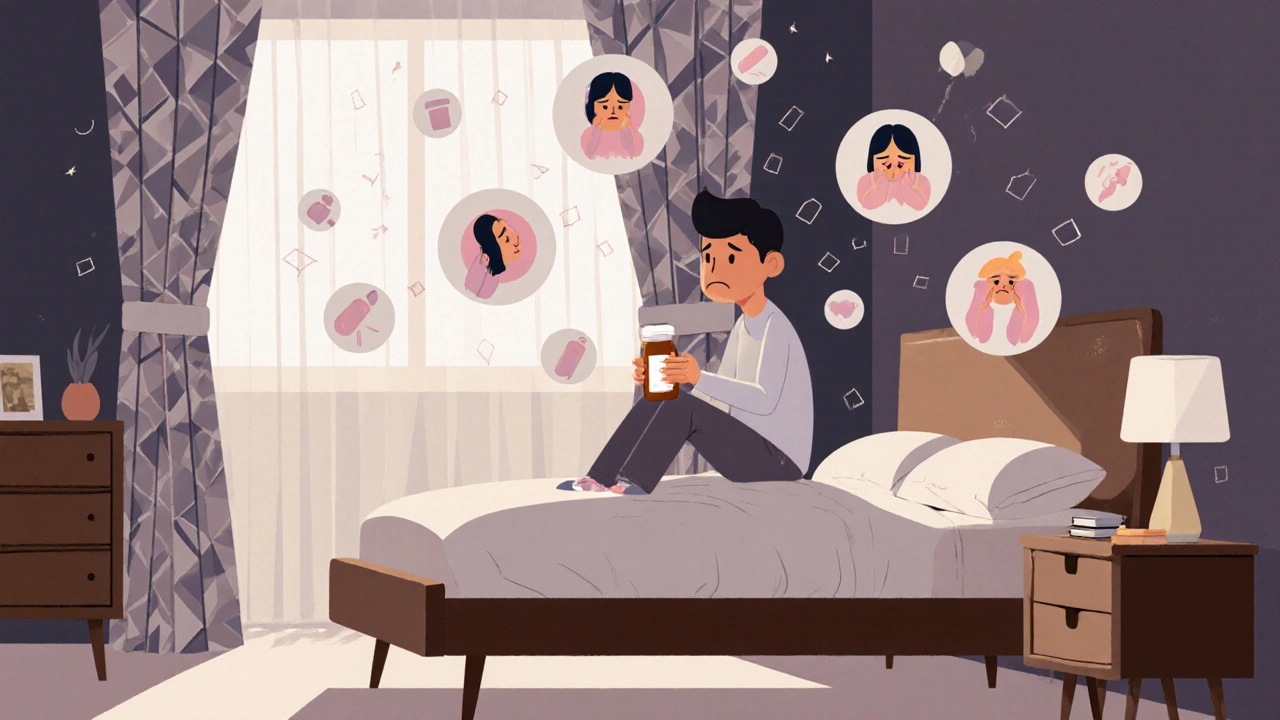You’ve been prescribed a medication. You know it’s important. You even believe in it. But then the side effects hit - the dizziness, the nausea, the fatigue, or maybe just that strange metallic taste that won’t go away. Suddenly, skipping a dose feels like a small act of self-preservation. You tell yourself you’ll take it tomorrow. Then the next day. And the next. By the time you realize you haven’t taken it in a week, you’re not sure if you should even restart.
This isn’t laziness. It’s not lack of willpower. It’s one of the most common, least talked about reasons people stop taking their medicine: side effects.
According to the National Library of Medicine, medication adherence means taking your drugs exactly as prescribed - the right dose, at the right time, for the full length of treatment. Sounds simple, right? But here’s the hard truth: between 30% and 50% of people don’t do it. And side effects are one of the biggest reasons why.
Why Side Effects Make You Skip Doses
It’s not just about discomfort. It’s about fear. You start taking a new pill for high blood pressure, and suddenly you’re dizzy every morning. You think, Is this pill making me worse? You read online that this drug can cause liver damage. You hear a friend say their cousin had a bad reaction. Your brain starts connecting dots that aren’t there - and you stop taking it.
Studies show that people with chronic conditions like diabetes, heart disease, or depression are especially likely to quit when side effects show up. One study found that patients with depression were twice as likely to skip their meds compared to those without mental health symptoms. That’s not coincidence. When you’re already feeling low, adding nausea or brain fog feels like too much to carry.
And it’s not just mental health. For older adults managing five or more medications, side effects pile up. A mild headache from one drug, dry mouth from another, drowsiness from a third - it’s not just annoying. It’s exhausting. Many people just give up, thinking, Maybe I’m better off without all these pills.
The data tells a brutal story: for every 100 prescriptions written, only 25% to 30% are taken exactly as directed. And side effects are the top reason people stop after the first refill.
The Hidden Cost of Skipping Pills
Skipping your meds doesn’t just mean your condition won’t improve. It can make things worse - fast.
Up to 50% of treatment failures are directly tied to nonadherence. That means if you’re not taking your blood thinner, your risk of stroke goes up. If you miss doses of your diabetes medication, your blood sugar spikes, damaging nerves and kidneys over time. If you stop your antidepressant cold turkey, you could trigger withdrawal symptoms - or worse, a relapse that lands you in the hospital.
The numbers are staggering. In the U.S. alone, nonadherence causes about 125,000 preventable deaths every year. It’s responsible for up to 25% of hospital admissions. That’s not just bad for you - it’s bad for the system. The annual cost of nonadherence ranges from $949 to over $44,000 per person. And a lot of that cost comes from treating problems that could’ve been avoided if you’d just kept taking your pills.
Here’s the irony: the side effect you’re trying to avoid might be less dangerous than the disease you’re not treating.
What Works: Real Strategies to Keep Taking Your Meds
You don’t have to suffer in silence or quit cold turkey. There are real, proven ways to manage side effects and stay on track.
1. Talk to your pharmacist - not just your doctor.
Most people think pharmacists just hand out pills. They’re wrong. Pharmacists are trained to spot side effect patterns, adjust timing, suggest alternatives, and even help you cut pill burden. One study showed that when pharmacists worked directly with patients to manage side effects, adherence jumped from 74% to 89%. That’s not magic. That’s expertise.
Ask your pharmacist: “Is this side effect normal? When does it usually go away? Is there a different time of day I should take this?” They’ve seen it all - and they can help you make sense of it.
2. Don’t assume it’s permanent.
Many side effects fade after a few days or weeks. Nausea from a new antibiotic? It often clears up after 3-5 days. Drowsiness from a blood pressure med? Switching from morning to night can help. Dry mouth from an antidepressant? Sipping water, chewing sugar-free gum, or using a saliva substitute can make a big difference.
Don’t quit because it feels bad at first. Give it time - but only if you’ve talked to a professional first.
3. Simplify your regimen.
Seven pills a day? That’s hard to keep track of. Ask your doctor or pharmacist if you can switch to combination pills, extended-release versions, or once-daily options. Some meds can be safely taken together. Others can be spaced out. Reducing the number of daily doses can boost adherence by up to 40%.
4. Use tools - not just reminders.
Phone alarms help, but they’re not enough. Pill organizers with compartments for morning, afternoon, and night? That’s better. Smart pill dispensers that lock until it’s time and send alerts to a family member? Even better. Some apps even let you log side effects as they happen - and share that data with your care team.
5. Get support - not judgment.
Feeling guilty about skipping doses? You’re not alone. But guilt doesn’t fix adherence. Support does. Join a patient group. Talk to someone who’s been there. A 2025 report from ISPOR found that patients who had regular check-ins - even brief phone calls - were far more likely to stick with their treatment. You don’t have to do this alone.

What Doesn’t Work (And Why)
Many common “solutions” fail because they ignore the real problem: side effects aren’t just physical - they’re emotional and psychological.
Just telling people to “be responsible” doesn’t work. You can’t will yourself out of dizziness or fatigue. And shaming someone for missing a dose makes them less likely to come back.
Mass email reminders? Ineffective. Studies show that generic text messages or mailed brochures have only a 52% success rate. Face-to-face conversations? 83%.
Ignoring side effects in medical records? Dangerous. A 2025 study in the British Journal of Clinical Pharmacology found that pharmacists documented nonadherence only 52% of the time - compared to 85% for nurses. If your side effects aren’t written down, they won’t be addressed. Make sure your provider knows what you’re feeling - and when.
When to Ask for a Change - Not Just a Coping Strategy
Some side effects are manageable. Others are red flags.
Call your doctor immediately if you experience:
- Severe rash, swelling, or trouble breathing
- Chest pain or irregular heartbeat
- Sudden confusion or memory loss
- Severe depression or thoughts of self-harm
- Unexplained bleeding or bruising
For less urgent but still troubling side effects - like constant nausea, weight gain, or sexual dysfunction - don’t wait. Schedule a follow-up. Ask: “Is there another medication that works similarly but doesn’t cause this?”
There are often alternatives. A statin that causes muscle pain? There are others. An antidepressant that causes weight gain? Several don’t. You just have to ask.

The Bigger Picture: Why This Matters Beyond You
Medication adherence isn’t just a personal habit. It’s a public health issue. Medicare Star Ratings - which determine how much hospitals and insurers get paid - are directly tied to how well patients take their meds. If you stop taking your blood pressure pill, your plan could lose money. Your doctor could lose bonuses. Your community could lose resources.
And with value-based care on the rise, providers are now financially incentivized to help you stay on track. That means more pharmacist visits, more digital tools, and more personalized support - if you let them in.
Side effects aren’t a sign you’re doing something wrong. They’re a signal that your treatment plan needs tweaking. And tweaking is better than quitting.
What You Can Do Today
Here’s a simple 3-step plan to get back on track:
- Write down every side effect you’ve had - even if it seems small. Note when it started and how bad it is (1 to 10).
- Call your pharmacist. Ask: “Which of these are normal? Which should I worry about? Can we adjust timing or dosage?”
- Ask your doctor: “Is there another option that doesn’t cause this?” Don’t settle for “It’ll get better.” Ask for alternatives.
You don’t have to suffer to be healthy. You just have to speak up.


Write a comment